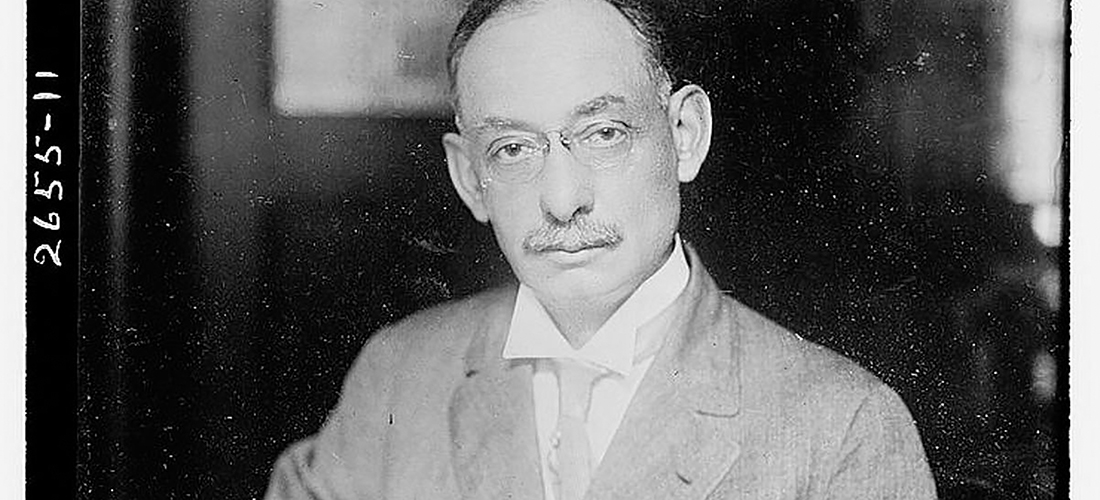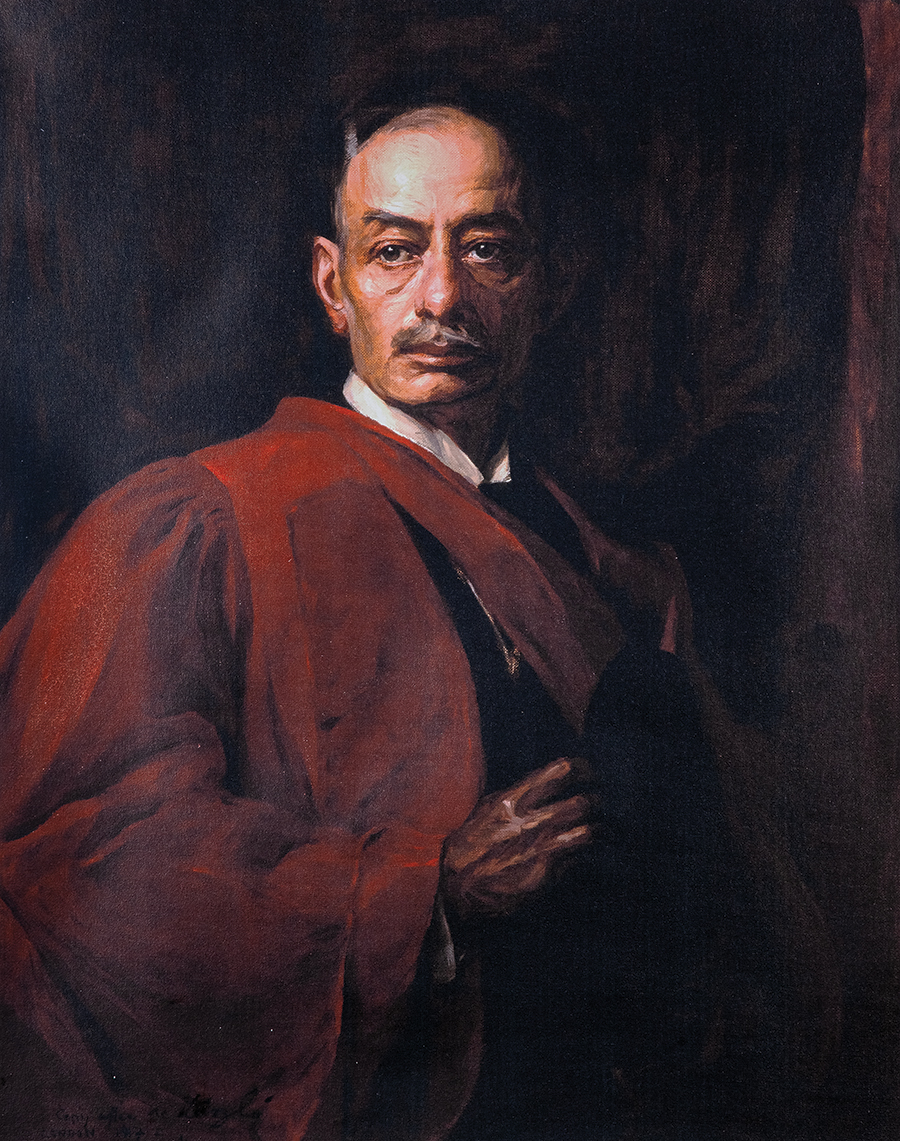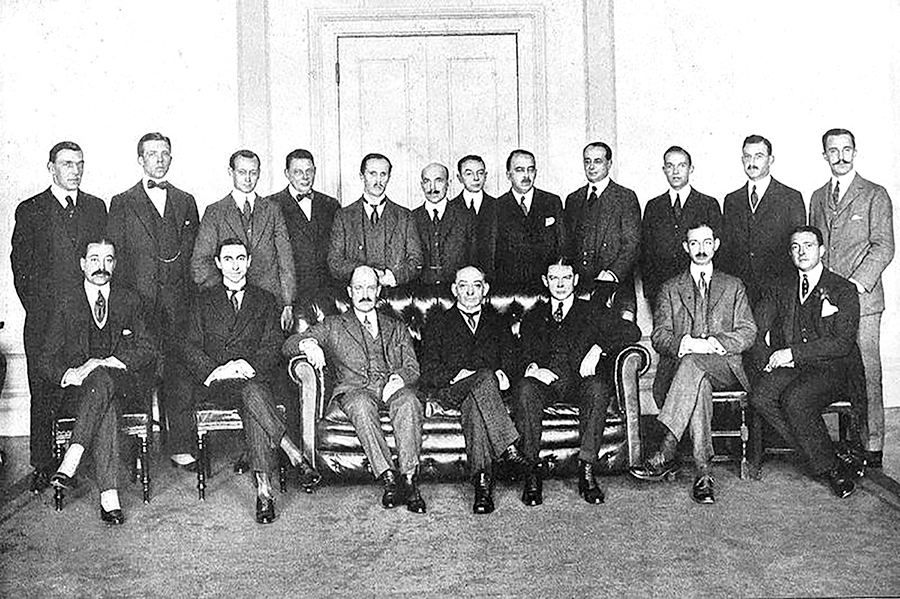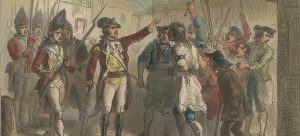
The greatness of Walter Hines Page
By Bill Case
Woodrow Wilson spent the bulk of his first term steering America clear of World War I, which had raged over Europe for 2 1/2 years when he made his bid for reelection. He used the slogans “America First” and “He Kept Us Out of War” during his 1916 campaign, which led to his narrow electoral victory. However, a growing number of Americans felt that Wilson’s neutrality policy was wrongheaded following his response to a German U-boat’s May 1915 sinking of the unarmed British ocean liner Lusitania with 128 American passengers aboard. Few in his administration spoke in opposition.

One member of the inner circle who dared to question the president’s approach was Walter Hines Page, America’s ambassador to Great Britain. Wilson had appointed his longtime confidant to the prestigious post in 1913. Page’s selection was not based on his diplomacy experience, since he had none. It had more to do with rewarding the native North Carolinian for his role in aiding Wilson’s political advancement over a 30-year period.
It was presumed the ambassadorship would provide the 57-year-old Page a mostly trouble-free conclusion to a remarkably eclectic career that had included successful turns in academia, journalism, publishing, social reform, public policy advocacy and farming. But the ambassador considered it his duty to inform the president of British (and his own) disapproval with the administration’s failure to act more decisively toward Germany. His fault-finding missives from London irritated Wilson, who complained that Page “seemed more British than the British.” A degree of frost formed over their relationship.

Page was born in 1855 in a small settlement in Wake County, North Carolina, that eventually became the city of Cary. His father, Allison Francis (Frank) Page, founded the town. A rugged, God-fearing Methodist, Frank Page made a small fortune extracting turpentine from pine trees and sawmilling them into lumber. Standing an impressive 6 feet 5 inches, he commanded respect bordering on awe. Walter’s mother, Catherine, was of a more intellectual bent, usually observed with a book in her hands.
The tall, gangling, curly-headed boy’s parents steered their scholarly son in the direction of the ministry, sending the 16-year-old to Methodist-run Trinity College, located in the backwoods of Randolph County (later the school moved to Durham and was renamed Duke University).
Wat, as he was called, was miserable at Trinity, and after an unhappy year transferred in 1872 to another Methodist school, Randolph-Macon College, in Ashland, Virginia.
“It was at Ashland that I first began to unfold,” Page would later remark. “Dear old Ashland!” Though he loved school he resisted his father’s wishes that he become a minister. “I’m damned if I’ll become a Methodist preacher,” he told his father. After a disappointed Frank refused to pay for further tuition, Walter self-financed the remainder of his education.
In 1876, Page was one of 21 students gaining admittance to America’s first graduate school at Johns Hopkins University. Initially, he flourished in the intense regimen, but by the midterm of his second year, he had become bored with the nuances of Greek and Latin, disparagingly calling himself a “Greek drudge,” and left without completing his course of study.
Visualizing a career in journalism and harboring “dreams and aspirations” of owning and editing a magazine, he invested $1,000 and became half-owner and the editorial writer of a fledgling Louisville weekly called The Age after teaching there.
Unfortunately, it folded in June 1879, barely three months after his investment.
Undaunted, Page combed his native North Carolina looking for “any sort” of journalistic position, but, as he ruefully put it, “journalism didn’t seem in any hurry to make up its mind to admit me.”
During a summer stay in Cary, Page fell in love with Alice Wilson, whom he’d first met as a teenager. The smitten couple became engaged during the 1879 Christmas holidays, postponing marriage until Page could obtain gainful employment.
Unable to find his footing as 1880 loomed, a breakthrough occurred in January when Walter Page landed a job as a reporter at a St. Joseph, Missouri, newspaper, The Gazette, contributing all kinds of articles “from stockyard reports to political editorials and heavy literary articles.” After five months, the publisher promoted young Page to editor-in-chief and raised his salary, giving
Walter and Alice the wherewithal to tie the knot in November 1880. Page wrote to several Northern newspapers, advising them of his intention to travel, observe and write about the post-Civil War South.
His letter-writing gambit succeeded. The big-city papers printed his submissions and paid for the privilege. “I had money in my pocket for the first time in my life,” he recalled. Moreover, the essays impressed the editor of the New York World, who offered Page a correspondent’s job with the paper. He accepted and headed north. His beat included congressional hearings regarding tariff measures as well as the tariff commission itself.
Page’s coverage of the commission brought him to Atlanta in 1882, where he met 26-year-old Woodrow Wilson. The two men engaged in a discussion regarding the merits of protectionism versus free trade. Believing he had discovered a budding political star, Page would gush to a colleague that Wilson “has one of the finest minds in America. Keep your eye on him!”
When the World changed ownership in May 1883, Page resigned and returned to North Carolina hoping to personally own and edit a publication in his home state. With financial help from his father, he launched a weekly newspaper in Raleigh, The State Chronicle. Page’s editorials lauded Democratic presidential candidate Grover Cleveland and derided local politicians as “small men” holding obsolete and parochial views.
The paper proved unprofitable, however, and in February 1885, Page ceded its control to Josephus Daniels (who would later buy Raleigh’s principal newspaper, the News and Observer), and retreated to New York. Though still revering North Carolina, the frustrated Page abandoned thoughts of making a living there. He told his father, “there is no (use) in my trying to do anything down south anymore. I have proved disastrous every time.”
Comfortably ensconced in Manhattan with Alice and two toddlers, Ralph
and Arthur (who would later be joined by two more children, Frank and
Katharine), Page penned freelance articles for magazines like The Atlantic and Harper’s Magazine mostly pertaining to the South and national politics. He was becoming, as one biographer put it, “a self-appointed but recognized ambassador from the South to the North.”
Page rose to prominence in New York’s magazine scene — unusual for a Southerner at the time — ultimately landing in Boston as the editor of The Atlantic — the magazine industry’s gold standard — and its book-publishing parent, Houghton, Mifflin & Company.
As editor, Page cultivated the era’s top fiction writers, and expanded Atlantic’s treatment of political topics such as American imperialism and the perils of unregulated monopolies. At Page’s behest, his friend Woodrow Wilson contributed three public policy articles.
Page’s gravitation toward national politics did not deter him from expounding on a pet concern: Southern educational reform. He spoke on the subject in Greensboro at the Normal School’s 1897 commencement exercises. In his eloquent “Forgotten Man” speech, which served as an important catalyst for educational reform in North Carolina, Page maintained that the state had
failed to develop its most valuable resource, “the people themselves . . . forgotten and neglected.” He decried North Carolina’s long history of providing scant resources to educate the less fortunate. These were the people whom “both the politician and the preacher have failed to lift.”
Though sitting in one of publishing’s most prestigious editorial chairs, Page still longed to be his own boss. He resigned from The Atlantic in 1899 and, after a brief misbegotten adventure with McClure’s Magazine, ventured into the book publishing business with Frank in New York. Doubleday, Page & Company started small, but grew quickly. Page enticed prominent men of letters like Theodore Dreiser, Booker T. Washington, Rudyard Kipling and Upton Sinclair to join the publisher’s list. Woodrow Wilson’s book The New Freedom was sold under the Doubleday, Page umbrella. The company published a magazine, The World’sWork, which became Page’s primary focus.
Sons Ralph and Frank would follow their father into journalism. Ralph wrote a successful book as well as articles for The World’s Work. Frank became an editor.
Meanwhile, Page continued to assist Woodrow Wilson’s political advancement.
He came to his fellow Southerner’s aid in 1910 when Wilson, then the president of Princeton University, successfully ran for governor of New Jersey.
Wilson’s meteoric political rise was capped by his election to the presidency two years later. Page played a significant role in Wilson’s presidential campaign, raising money and providing reams of favorable publicity in The World’s Work. Following the election, Wilson met with Page to obtain the latter’s advice regarding prospective administration appointments. The Washington rumor mill speculated that The World’s Work editor would soon be appointed either secretary of Agriculture or secretary of the Interior.
On March 26, 1913, now-President Wilson threw Page a curveball. Instead of the anticipated Washington Cabinet post, Wilson offered Page the position of ambassador to Great Britain. The surprised Page harbored misgivings over the prospect of leaving America for an extended period but understood the ambassadorship was a glamorous assignment. He agreed to serve, and boarded the ocean liner Baltic sailing for England on May 15, 1913. “Here I am going to London to talk international affairs with the men who rule the British Empire,” wrote Page while aboard ship.
Indeed, he got along famously with the bluebloods in London’s highest places: royalty, members of Parliament, and most especially Sir Edward Grey, the foreign minister, who would become a close personal friend.
Page regarded it his responsibility to provide the president unvarnished
British reaction to U.S. policies. One such example occurred when Congress enacted legislation in 1912 exempting American ships from the payment of tolls when passing through the Panama Canal. An outraged British government claimed this measure breached a treaty providing that ships of all nations would be treated equally in their use of the canal. Page’s September 13, 1913 letter to Wilson cited “the dishonorable attitude of our Government about the Panama Canal tolls . . . We made a bargain — a solemn compact — and we have broken it.”
Wilson agreed with Page’s view and appreciated the ambassador’s hard-hitting assessment. “Your letters are like a lamp to my feet,” responded the president. Wilson persuaded Congress to repeal the exemption.
Throughout the first year-and-a-half of Page’s ambassadorship, Wilson expressed delight with his friend’s erudite correspondence. “I hope that Walter Page’s letters will be published. They are the best letters I have ever read!” exclaimed the president.
The outbreak of World War I in July 1914 aggravated the manifold burdens of Ambassador Page’s office. London-based Americans, fearful of being caught in the middle of the war, were leaving England in droves, requiring the ambassador’s assistance. But the ambassador’s hardest task was to avoid doing anything that would contravene American neutrality toward the belligerents while at the same time conveying his personal sympathy and friendship to Great Britain. The exhausting duties caused his health to deteriorate as an ulcer flared up, made worse by Page’s incessant smoking.
During the first years of the war, Wilson sought to be an impartial mediator, hoping to obtain peace by seeking common ground between the warring countries. Page considered the president’s impulses noble but naïve. According to Page, the German leaders, were “another case of Napoleon— even more brutal; a dream of universal conquest . . . Prussian militarism (must) be utterly cut out, as surgeons cut out a cancer. And the Allies will do it — must do it — to live.”
Wilson’s reading pleasure dissipated as Page’s increasingly unwelcome correspondence advanced positions out of synch with those of the administration.
With his re-election campaign looming, Wilson was determined to do nothing that could draw America into the war or undermine his role as a mediator of peace. The antagonized president ignored his ambassador’s entreaties, other than to warn him through staff “to please be more careful not to express any unneutral feeling either by word of mouth or by letter.”
Page was stunned by Wilson’s failure to comprehend the threat to democracy caused by autocratic Germany. His exasperation grew when the president issued a “we are too proud to fight” statement in response to the sinking of the Lusitania. After the Germans torpedoed another ship with Americans aboard,
Page wrote the president in January 1916 that officials in the prime minister’s cabinet had confided their impression “that the United States will submit to any indignity.”
American state department diplomats began meeting regularly with their British counterparts without bothering to notify the out-of-step ambassador.
Page visited America during August and September 1916, ultimately gaining an audience with the president on September 23. Although cordial enough, the president stiff-armed Page’s assertion that Germany was the world’s scourge. The ambassador was profoundly discouraged with Wilson’sassessment that the war was “essentially a quarrel to settle economic rivalries between Germany & England.”
Wilson assumed his bargaining hand as peacemaker would be strengthened by his re-election, but he was wrong. Two events in early 1917 would end his mediation efforts and draw America into the conflict.
In an attempt to starve out its enemy, Germany announced that it would henceforward commit unrestricted submarine warfare against any neutral countries’ ships transporting goods to England, including the U.S. This was followed by British intelligence’s discovery of the “Zimmerman telegram” cabled by the German Foreign Office to the Mexican government. It proposed a military alliance between those two countries in which Mexico would ultimately recover the states of Texas, Arizona and New Mexico in the event America entered the war. Americans were outraged at Germany’s treachery, and public opinion suddenly turned in favor of entering the war.
It took another month for Wilson to abandon hopes for peace and ask Congress to declare war, but he finally did so on April 2. Page was elated. “I cannot conceal nor can I repress my gratification we are in the war at last,” he wrote. He felt vindicated that his “letters & telegrams . . . for nearly two years” had proved clairvoyant and helped alter Wilson’s pacifistic stance. “I have accomplished something . . . I swear I have.”
The war dragged into 1918, and American casualties mounted, including
Page’s nephew, Allison Page, a U.S. Marine, killed in battle at Belleau Wood.
Page’s health, never robust, got progressively worse. He suffered from hardening of the arteries, high blood pressure and early-stage emphysema. Told he would require six months’ rest, Page wrote Wilson on August 1 and submitted his resignation. When he left London on October 2, he required support on each arm to make it to his private railroad car. Upon reaching New York, further examination added diagnoses of retinal hemorrhages, heart congestion and kidney failure to Page’s mounting woes.
On December 11, Page boarded a private railroad car and came home to North Carolina. Literally carried off the train by his son at the Aberdeen station, he remarked, “Well, Frank, I did get here after all, didn’t I?”
Walter and Alice Page rented a cottage in Pinehurst.
Page was reunited with several of his siblings, but his condition declined a week later. He died on December 21. Following its practice of not printing a word about deaths in Pinehurst, the Pinehurst Outlook, coincidentally edited by Ralph, made no announcement of his father’s demise.
But Page’s Christmas Eve funeral at Page Memorial Church and burial at the Page family plot at Old Bethesda Cemetery in Aberdeen did receive international attention. Given his role in ending the “War to End All Wars,” virtually giving his life to the cause, Walter Page was hailed as an American hero. His grave became a mecca, visited by grateful Americans paying him honor. The state built a road to the cemetery to absorb the traffic.
Johns Hopkins would honor Page by founding the Walter Page School of International Relations.
While Wilson and his administration did not always appreciate Walter Hines Page, England still does. In a vestibule of Westminster Abbey is a sculpture of Page with a testament that reads, “The friend of Britain in her sorest need.” OH
Pinehurst resident Bill Case is PineStraw’s history man. He can be reached at
Bill.Case@thompsonhine.com.





